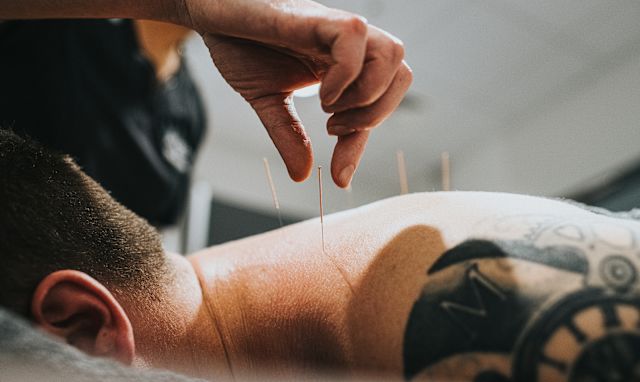Updated on December 6, 2024.
Can the millennia-old practice of inserting needles into your skin really improve your health? Proponents of acupuncture think so, and science backs them up to an extent. There has been a great deal of research into the effectiveness of this manipulative therapy over the years. Today, it’s even taught in many medical schools.
But what is acupuncture, exactly? What is it useful for? And if you’re interested in it, what steps can you take to help ensure a safe, effective experience? Here’s what to know.
The basics of acupuncture
Acupuncture involves trained practitioners inserting thin, sterilized needles into a person’s skin at specific points throughout the body. Sometimes these needles are then moved by the practitioner’s hands or amplified with electrical currents.
Acupuncture falls under the umbrella of Traditional Chinese Medicine (TCM). TCM focuses on the concept of Qi, or a fundamental life force that dwells in each person. If someone’s Qi, which flows along a person’s energy channels, or meridians, becomes blocked, it can cause illness. TCM practitioners believe that acupuncture can bring harmony back to the flow of a person’s Qi and return them to health.
In the United States, acupuncture is usually used to help relieve pain, though it may have other applications. There are several theories regarding its effects on pain. It may stimulate the nervous system itself, or the tissue in areas where the needles are inserted.
It’s possible, too, that the overall experience of acupuncture—as opposed to the actual insertion of needles—can explain some of the benefits. These benefits are called “nonspecific effects.” They might rely on things like a person’s belief in the effectiveness of acupuncture, which is also known as the placebo effect. The rapport between the person receiving the acupuncture and their acupuncturist may also be a potential factor.
What to expect from an acupuncture session
Each acupuncture practitioner will have a slightly different approach, but there are some general approaches that are common to most appointments. First, an acupuncturist will take your medical history. They’ll ask you about your symptoms, and inquire into your lifestyle, diet, and activities. They may give you a physical examination, paying special attention to your pulse, how your face and tongue present, and any areas of your body that are experiencing pain.
Next, the acupuncturist will have you lie down and begin to insert the needles. You may feel them prick the skin, but it's not typically painful. Once the needles are in, the acupuncturist may gently manipulate them or use low electrical pulses to stimulate them. You can expect to be lying down and relaxing with the needles in place for about 10 to 15 minutes, although sometimes it goes longer.
You may not feel any change in your condition after your first session, or you may feel renewed energy or relaxation. You and your acupuncturist will work together to come up with a longer-term treatment plan. A full course of acupuncture often involves six to eight treatments over the course of three to eight weeks.
What acupuncture can help treat
Research suggests acupuncture could help ease pain stemming from a number of health conditions. More research is needed to confirm its effectiveness, but it may be useful for:
- Osteoarthritis
- Back and neck aches
- Headaches and migraines
- Sciatica
- Carpal tunnel syndrome
- Post-operative recovery from surgery
When used together with conventional drug therapy, acupuncture may help to relieve cancer pain, as well.
It could also ease symptoms aside from pain. Some studies suggest it may be helpful for improving seasonal allergies, urinary incontinence, and even hot flashes tied to menopause. For asthma, while acupuncture doesn’t improve lung function, it can improve quality of life.
Acupuncture is not a panacea or cure-all, however. For example, the practice is often sought out to help people quit smoking. But in 2021, a panel of experts called the United States Preventive Services Task Force decided not to recommend acupuncture as a stop-smoking treatment because only very limited research shows any level of effectiveness. Studies also suggest it’s not particularly helpful for several other health conditions, including irritable bowel syndrome and female infertility.
Talk to your healthcare provider
Acupuncture is a safe treatment when delivered by state-licensed complementary health practitioners. It often works best when offered in tandem with other treatments. Be sure to check in with your healthcare provider to discuss any symptoms or health issues. They can recommend an array of appropriate treatment options, which may include acupuncture if they recommend it for you and your condition.







